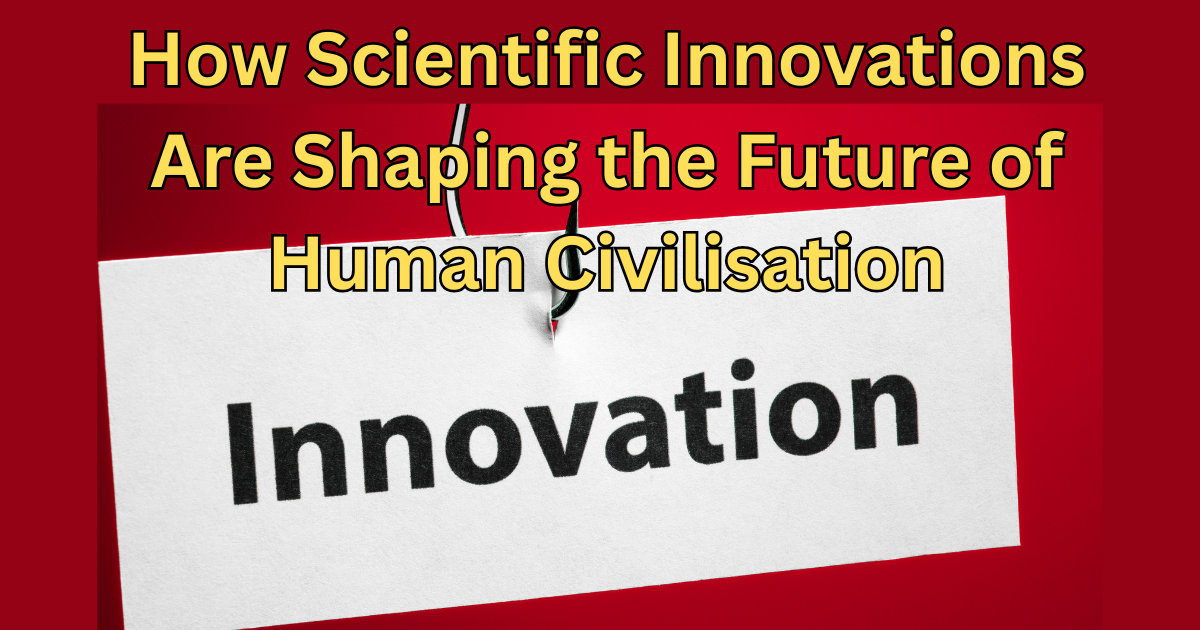How Scientific Innovations Are Shaping the Future of Human Civilisation: We live in an era of rapid scientific and technological changes that is profoundly impacting our world. From healthcare to transportation to energy, new innovations emerging from cutting-edge research have the potential to both improve lives and address some of society’s greatest challenges.
How Scientific Innovations Are Shaping the Future of Human Civilisation
Science and technology for a sustainable future help us understand our environment and impact on it, which is essential for making smart decisions about how to use our resources. It can also help us find solutions to problems , such as climate change and pollution, and improve the quality of life for all people.
Powerful new gene-editing tools like CRISPR allow researchers to precisely alter DNA sequences and modify gene function. This technology has opened up promising new approaches for treating genetic diseases, improving crops, and developing innovative therapies.

The Role of Innovation in Shaping the future
Innovation plays a pivotal role in shaping the future, driving progress, and transforming societies. It is the catalyst that propels us forward, enabling us to overcome challenges, discover new possibilities, and create a better world. From technological advancements to groundbreaking ideas, innovation has the power to revolutionise industries, improve lives, and redefine the way we live and work.
1. Driving Economic Growth:
This is a key driver of economic growth as it fosters the development of new industries, creates jobs, and enhances productivity. For instance , the rise of digital technology has led to the emergence of disruptive companies like Uber and Airbhb accommodation sector.
2. Solving Global Challenges:
Innovation plays a crucial role in addressing pressing global challenges such as climate change, poverty, healthcare access, and food security.
3. Enhancing Efficiency and Sustainability: Innovation drives efficiency for streamlining processes and optimising resources. Through automation and artificial intelligence, businesses can improve productivity while reducing costs. Innovative approaches like circular economy models promote sustainability by minimising waste generation.
4. Fostering social progress: Innovation has the potential to bring about positive social changes by empowering marginalised communities and promoting inclusivity. For instance, mobile banking services have enabled financial inclusion for millions of people who previously lacked access to traditional banking systems.
5. Inspiring Creativity and Collaboration: Innovation, creativity and collaboration foster an environment where diverse perspectives and ideas can thrive. Platforms like open-source software and crowdsourcing enable individuals from different backgrounds to contribute their expertise.
6. Transforming industries:
Innovation disrupts traditional industries, forcing them to adopt or risk becoming obsolete; for instance, the rise of e-commerce has revolutionised the retail sector, challenging brick-and-mortar stores to Similarly, advancements in autonomous
Quantum computing leverages the bizarre properties of quantum physics to perform calculations that would be impossible for classical computers. Though the technology is still emerging, quantum computers have the potential to be transformational, from advancing materials science and drug discovery to revolutionising encryption and cybersecurity.
Science is unprecedented understanding and technologies that stand to fundamentally remake society. But realising the promise – while mitigating risks of emerging innovations – will require thoughtful leadership to craft science policies and applications that maximise benefits for humanity as a whole. the Opportunities for progress have never been more than profound of the society
Contribution of genetic engineering to molecular evolution
The Impact of Genetic Energy on Innovative biotechnology
Conclusion
In this article, we discussed how scientific innovations are shaping the future of human civilisation: We live in an era of rapid scientific and technological changes that is profoundly impacting our world. Though the technology is still emerging, quantum computers have the potential to be transformational. this is for For instance, mobile banking services have enabled financial inclusion for millions of people who previously lacked access to traditional banking systems.
